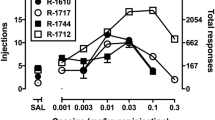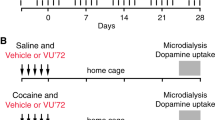Abstract
Rationale
Evidence is accumulating that metabotropic glutamate 5 (mGlu5) receptors play an important role in regulating the reinforcing actions of drugs of abuse.
Objectives
We examined the effects of the mGlu5 receptor antagonist MPEP on cocaine consumption and cocaine-enhanced brain reward function in rats.
Methods
Cocaine consumption was measured in rats with 1 h (short-access; ShA) or 6 h (long-access; LgA) daily access to intravenous cocaine (0.25 mg/infusion) self-administration. Cocaine-enhanced brain reward function was measured by cocaine-induced lowering of intracranial self-stimulation (ICSS) thresholds.
Results
Cocaine consumption remained stable and unaltered over successive self-administration sessions in ShA rats. In contrast, cocaine consumption progressively “escalated” in LgA rats. MPEP (1–9 mg/kg) dose-dependently decreased responding similarly in ShA and LgA rats. These data suggest that mGlu5 receptors regulate the reinforcing properties of cocaine, and that this action of mGlu5 receptors is independent of the escalation in consumption associated with extended access to cocaine self-administration. MPEP doses (1–9 mg/kg) that decreased cocaine self-administration elevated brain reward thresholds to a similar degree in cocaine- and vehicle-treated rats, indicating that MPEP induced a negative affective state. The additive effects of MPEP and cocaine on thresholds resulted in attenuation of the magnitude of cocaine-induced (10 mg/kg) lowering of ICSS thresholds.
Conclusions
Overall, mGlu5 receptors appear to play an important role in regulating cocaine consumption, and also in regulating brain reward function. Further, it is likely that blockade of mGlu5 receptors may attenuate cocaine consumption, at least in part, by decreasing the baseline activity of brain reward circuitries.


Similar content being viewed by others
References
Ahmed SH, Koob GF (1998) Transition from moderate to excessive drug intake: change in hedonic set point. Science 282:298–300
Ahmed SH, Kenny PJ, Koob GF, Markou A (2002) Neurobiological evidence for hedonic allostasis associated with escalating cocaine use. Nat Neurosci 5:625–626
Backstrom P, Bachteler D, Koch S, Hyytia P, Spanagel R (2004) mGluR5 antagonist MPEP reduces ethanol-seeking and relapse behavior. Neuropsychopharmacology 29:921–928
Baxter BL, Gluckman MI, Stein L, Scerni RA (1974) Self-injection of apomorphine in the rat: positive reinforcement by a dopamine receptor stimulant. Pharmacol Biochem Behav 2:387–391
Caine B, Koob GF (1993) Intravenous drug self-administration techniques in animals. In: Sahgal A (ed) Behavioural neuroscience: a practical approach. IRL Press, Oxford, pp 117–143
Cervo L, Samanin R (1995) Effects of dopaminergic and glutamatergic receptor antagonists on the acquisition and expression of cocaine conditioning place preference. Brain Res 673:242–250
Chiamulera C, Epping-Jordan MP, Zocchi A, Marcon C, Cottiny C, Tacconi S, Corsi M, Orzi F, Conquet F (2001) Reinforcing and locomotor stimulant effects of cocaine are absent in mGluR5 null mutant mice. Nat Neurosci 4:873–874
Esposito RU, Motola AH, Kornetsky C (1978) Cocaine: acute effects on reinforcement thresholds for self-stimulation behavior to the medial forebrain bundle. Pharmacol Biochem Behav 8:437–439
Frank RA, Martz S, Pommering T (1988) The effect of chronic cocaine on self-stimulation train-duration thresholds. Pharmacol Biochem Behav 29:755–758
Harris GC, Aston-Jones G (2003) Critical role for ventral tegmental glutamate in preference for a cocaine-conditioned environment. Neuropsychopharmacology 28:73–76
Harrison AA, Gasparini F, Markou A (2002) Nicotine potentiation of brain stimulation reward reversed by DHβE and SCH 23390, but not by eticlopride, LY 314582 or MPEP in rats. Psychopharmacology 160:56–66
Heidbreder CA, Bianchi M, Lacroix LP, Faedo S, Perdona E, Remelli R, Cavanni P, Crespi F (2003) Evidence that the metabotropic glutamate receptor 5 antagonist MPEP may act as an inhibitor of the norepinephrine transporter in vitro and in vivo. Synapse 50:269–276
Homayoun H, Stefani MR, Adams BW, Tamagan GD, Moghaddam B (2004) Functional interaction between NMDA and mGlu5 receptors: effects on working memory, instrumental learning, motor behaviors, and dopamine release. Neuropsychopharmacology 29:1259–1269
Kalivas PW, Duffy P (1998) Repeated cocaine administration alters extracellular glutamate in the ventral tegmental area. J Neurochem 70:1497–1502
Kenny PJ, Markou A (2004) The ups and downs of addiction: role of metabotropic glutamate receptors. Trends Pharmacol Sci 25:265–272
Kenny PJ, Gasparini F, Markou A (2003a) Group II metabotropic and α-amino-3-hydroxy-5-methyl-4-isoxazole propionate (AMPA)/kainate glutamate receptors regulate the deficit in brain reward function associated with nicotine withdrawal in rats. J Pharmacol Exp Ther 306:1068–1076
Kenny PJ, Koob GF, Markou A (2003b) Conditioned facilitation of brain reward function after repeated cocaine administration. Behav Neurosci 117:1103–1107
Kenny PJ, Paterson NE, Boutrel B, Semenova S, Harrison AA, Gasparini F, Koob GF, Skoubis PD, Markou A (2003c) Metabotropic glutamate 5 receptor antagonist MPEP decreased nicotine and cocaine self-administration but not nicotine and cocaine-induced facilitation of brain reward function in rats. Ann N Y Acad Sci 1003:415–418
Kenny PJ, Polis I, Koob GF, Markou A (2003d) Low dose cocaine self-administration transiently increases but high dose cocaine persistently decreases brain reward function in rats. Eur J Neurosci 17:191–195
Kokkinidis L, McCarter BD (1990) Postcocaine depression and sensitization of brain-stimulation reward: analysis of reinforcement and performance effects. Pharmacol Biochem Behav 36:463–471
Koob GF, Le HT, Creese I (1987) The D1 dopamine receptor antagonist SCH 23390 increases cocaine self-administration in the rat. Neurosci Lett 79:315–320
Kornetsky C, Esposito RU (1979) Euphorigenic drugs: effects on the reward pathways of the brain. Fed Proc 38:2473–2476
Laviolette SR, van der Kooy D (2003) The motivational valence of nicotine in the rat ventral tegmental area is switched from rewarding to aversive following blockade of the alpha7-subunit-containing nicotinic acetylcholine receptor. Psychopharmacology 166:306–313
Mansvelder HD, McGehee DS (2000) Long-term potentiation of excitatory inputs to brain reward areas by nicotine. Neuron 27:349–357
Markou A, Koob GF (1992) Construct validity of a self-stimulation threshold paradigm: effects of reward and performance manipulations. Physiol Behav 51:111–119
Markou A, Hauger RL, Koob GF (1992) Desmethylimipramine attenuates cocaine withdrawal in rats. Psychopharmacology 109:305–314
McGeehan AJ, Olive MF (2003) The mGluR5 antagonist MPEP reduces the conditioned rewarding effects of cocaine but not other drugs of abuse. Synapse 47:240–242
Olds J, Milner PM (1954) Positive reinforcement produced by electrical stimulation of the septal area and other regions of rat brain. J Comp Physiol Psychol 47:419–427
Paterson NE, Semenova S, Gasparini F, Markou A (2003) The mGluR5 antagonist MPEP decreased nicotine self-administration in rats and mice. Psychopharmacology 167:257–264
Pellegrino LJ, Pellegrino AS, Cushman AJ (1979) A stereotaxic atlas of the at brain. Plenum, New York
Popik P, Wrobel M (2002) Morphine conditioned reward is inhibited by MPEP, the mGluR5 antagonist. Neuropharmacology 43:1210–1217
Pulvirenti L, Maldonado-Lopez R, Koob GF (1992) NMDA receptors in the nucleus accumbens modulate intravenous cocaine but not heroin self-administration in the rat. Brain Res 594:327–330
Roberts DC, Koob GF, Klonoff P, Fibiger HC (1980) Extinction and recovery of cocaine self-administration following 6-hydroxydopamine lesions of the nucleus accumbens. Pharmacol Biochem Behav 12:781–787
Schenk S, Valadez A, Worley CM, McNamara C (1993) Blockade of the acquisition of cocaine self-administration by the NMDA antagonist MK-801 (dizocilpine). Behav Pharmacol 4:652–659
Smith JE, Koves TR, Co C (2003) Brain neurotransmitter turnover rates during rat intravenous cocaine self-administration. Neuroscience 117:461–475
Stewart J, de Wit H, Eikelboom R (1984) Role of unconditioned and conditioned drug effects in the self-administration of opiates and stimulants. Psychol Rev 91:251–268
Swanson CJ, Baker DA, Carson D, Worley PF, Kalivas PW (2001) Repeated cocaine administration attenuates group I metabotropic glutamate receptor-mediated glutamate release and behavioral activation: a potential role for Homer. J Neurosci 21:9043–9052
Ungless MA, Whistler JL, Malenka RC, Bonci A (2001) Single cocaine exposure in vivo induces long-term potentiation in dopamine neurons. Nature 411:583–587
Wilson MC, Schuster CR (1972) The effects of chlorpromazine on psychomotor stimulant self-administration in the rhesus monkey. Psychopharmacologia 26:115–126
Wolf ME (2003) Effects of psychomotor stimulants on glutamate receptor expression. Methods Mol Med 79:13–31
Zocchi A, Varnier G, Sartori I, Heidbreder CA (2002) The mGluR5 antagonist, MPEP, potentiates cocaine effects on dopamine levels in the shell subregion of the nucleus accumbens in the mouse (abstract). Neurochemistry Winter Conference, Programme and Abstracts, April 6–11, Solden, Austria
Acknowledgements
P.J.K. and B.B. contributed equally to this work. Supported by the National Association for Research on Schizophrenia and Depression (NARSAD) (P.J.K.), the Peter F. McManus Charitable Trust (P.J.K.), Fondation pour la Recherche Medicale (B.B.), and grants from Novartis (A.M.) and the National Institute on Drug Abuse (DA04398 to G.F.K. and DA11946 to A.M.). The authors thank Mike Arends for editorial assistance. This is manuscript number 15851-NP from The Scripps Research Institute.
Author information
Authors and Affiliations
Corresponding author
Rights and permissions
About this article
Cite this article
Kenny, P.J., Boutrel, B., Gasparini, F. et al. Metabotropic glutamate 5 receptor blockade may attenuate cocaine self-administration by decreasing brain reward function in rats. Psychopharmacology 179, 247–254 (2005). https://doi.org/10.1007/s00213-004-2069-2
Received:
Accepted:
Published:
Issue Date:
DOI: https://doi.org/10.1007/s00213-004-2069-2




